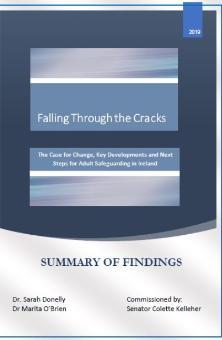'Falling Through the Cracks' Research (2019)

Research Report: (opens in a new window)Download
This project is part of Sarah's research on safeguarding
This research report was commissioned by (opens in a new window)Senator Colette Kelleher in order to explore how the absence of adult safeguarding legislation in the Irish context may be impacting on adults within the current safeguarding system from the perspective of social work practitioners, professionals or advocates who are working with them. The collaborators involved in this study include: (opens in a new window)the HSE National Safeguarding Office, (opens in a new window)the Irish Association of Social Workers (IASW), (opens in a new window)The Alzheimer Society of Ireland and (opens in a new window)Sage Advocacy.
Aims
The study seeks to shed light on how practitioners are navigating cases in the absence of primary legislation and to explore what benefits or challenges there might be should Adult Safeguarding legislation be fully enacted in the Irish context.
Methods
A qualitative approach involving semi-structured interviews (N=14) and focus groups (N=2) were utilised to explore differing perspectives across specialities involved in adult safeguarding casework using a critical incident technique. An online survey questionnaire was also administered with N=116 responses
Findings
Social workers reported that adults at risk were ‘falling through the cracks’ due to the absence of adult safeguarding legislation.In relation to older people, the issue of coercive control by another family member was repeatedly highlighted as a significant issue for which there was no legislative intervention available.Legislative powers such as a duty to cooperate, duty to share information and a duty to involve the adult at risk in the safeguarding process were deemed critically important but absent.In addition, social workers reported that the lack of access to support services for the adult at risk was significantly impacting on their ability to safeguard.
Conclusion
Whilst the current policy measures in place offer some protection, it is evident that social work practitioners believe that safeguarding procedures should be placed on a statutory basis to ensure the safeguarding process is applied in a consistent and effective way
Publications
Research Report: (opens in a new window)Download